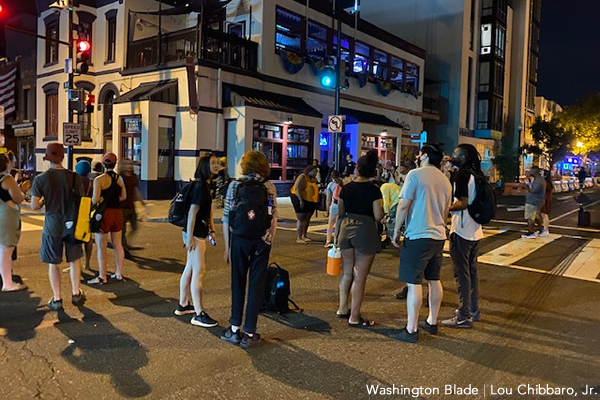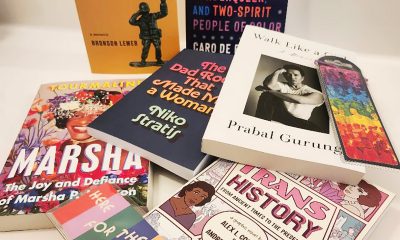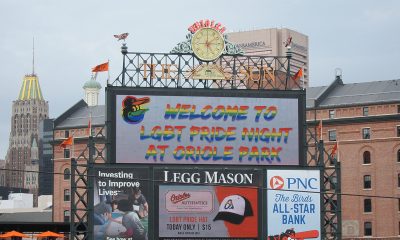Local
Nellie’s reopens, closes after protesters block entrance
Demands include public apology, release of video

Hours after it reopened for the first time in a month, Nellie’s Sports Bar on Tuesday night closed its doors again shortly after 8 p.m. when protesters formed a human chain to block the gay bar’s entrance doors.
About 50 protesters showed up outside Nellie’s, which is located at 9th and U Streets, N.W., about 8 p.m. after learning that the bar had reopened. D.C. police closed the streets surrounding Nellie’s to vehicle traffic as the protesters occupied the busy intersection.
Protesters have been assembling outside Nellie’s on Saturday nights for close to a month in response to a June 13 incident during D.C.’s LGBTQ Pride weekend when a security guard was captured on video dragging a Black woman down a flight of stairs shortly after a fight broke out among Nellie’s customers.
Nellie’s announced in a statement a short time later that it dismissed the security company for which the security guard was an employee and apologized for the guard’s action. But LGBTQ and racial justice activists have alleged that Nellie’s has a history of bias against people of color despite the fact that many of its longtime customers have been African-American men and women, LGBTQ and straight.
The city’s Alcoholic Beverage Control Board two weeks ago asked the Office of the D.C. Attorney General to open an investigation into allegations that Nellie’s violated the terms of its liquor license for its handling of fights that broke out in the bar shortly before Keisha Young, 22, was dragged by her hair down the stairs by the security guard.
The action by the ABC Board came after the D.C. Alcoholic Beverage Regulation Administration (ABRA) conducted its own investigation of the June 13 incident and concluded that Nellie’s appeared to have been engaged “in a method of operation conducive to unlawful conduct” at the time the fight broke out inside the bar. An ABRA spokesperson said it will be up to the Attorney General’s Office to make a final determination of whether Nellie’s violated city laws or regulations at the time of the fight.
The protesters assembled outside Nellie’s on Tuesday night after organizers posted messages on social media saying they had just discovered that Nellie’s had reopened and called on people show up outside the bar for a protest. Among the protest organizers was Makia Green, co-conductor of the Black-led community defense group Harriet’s Wildest Dreams, who describes herself as a queer trans nonbinary Black liberation organizer.
Green told the Washington Blade during the protest that protesters want Nellies to make a full public apology to Keisha Young and to release its own surveillance video of the incident involving Young being pulled down the flight of stairs. An ABRA report of the June 13 Nellie’s incident says ABRA has obtained a copy of the Nellie’s video.
Green said protesters are also calling on Nellie’s owner Douglas Schantz and his managers to participate in “public listening sessions” to hear concerns raised by Nellie’s Black customers and members of the community about alleged racial bias at the bar. She said that also among the protesters’ demands is for Nellies to make “reparations” for Young and the Black community.
According to Green, some but not all of the protesters are calling for Nellie’s to close permanently and for its building to be “put into the hands of Black queer and trans people” as a community center for social justice endeavors.
Nellie’s owner Schantz didn’t immediately respond to a request by the Blade for comment on the protesters’ action and to disclose whether he plans to reopen Nellie’s again this week.
Virginia
Walkinshaw wins Democratic primary in Va. 11th Congressional District
Special election winner will succeed Gerry Connolly

On Saturday, Fairfax County Supervisor James Walkinshaw won the Democratic primary for the special election that will determine who will represent Virginia’s 11th Congressional District.
The special election is being held following the death of the late Congressman Gerry Connolly, who represented the district from 2008 until 2024, when he announced his retirement, and subsequently passed away from cancer in May.
Walkinshaw is not unknown to Virginia’s 11th District — he has served on the Fairfax County Board of Supervisors since 2020 and had served as Connolly’s chief of staff from 2009 to 2019. Before he passed away, Connolly had endorsed Walkinshaw to take his place, claiming that choosing Walkinshaw to be his chief of staff was “one of the best decisions I ever made.”
The Democratic nominee has run his campaign on mitigating Trump’s “dangerous” agenda of dismantling the federal bureaucracy, which in the district is a major issue as many of the district’s residents are federal employees and contractors.
“I’m honored and humbled to have earned the Democratic nomination for the district I’ve spent my career serving,” Walkinshaw said on X. “This victory was powered by neighbors, volunteers, and supporters who believe in protecting our democracy, defending our freedoms, and delivering for working families.”
In addition to protecting federal workers, Walkinshaw has a long list of progressive priorities — some of which include creating affordable housing, reducing gun violence, expanding immigrant protections, and “advancing equality for all” by adding sexual orientation and gender identity to the Fair Housing Act.
Various democratic PACs contributed more than $2 million to Walkinshaw’s ad campaigns, much of which touted his connection to Connolly.
Walkinshaw will face Republican Stewart Whitson in the special election in September, where he is the likely favorite to win.
Maryland
LGBTQ suicide prevention hotline option is going away. Here’s where else to go in Md.
Changes will take effect July 17

By ANNA RUBENSTEIN | The national suicide prevention hotline will no longer offer specialized support to LGBTQ people, starting July 17, the Trump administration announced last week.
Dialing the hotline at 988 will still be available for crisis support. But callers will no longer be able to reach specific LGBTQ services by pressing Option 3. The change worries advocates because their data shows the LGBTQ community has a disproportionally high suicide rate.
Even after the option ends, here’s how to receive tailored support if you’re in Maryland.
The rest of this article can be found on the Baltimore Banner’s website.
Maryland
Silver Spring holds annual Pride In The Plaza
‘Today means inclusion. It means to build resilience’

Silver Spring’s annual Pride in the Plaza event took place on Sunday to celebrate the LGBTQ community and emphasize inclusion and resilience.
“Today means inclusion. It means to build resilience, love,” Robyn Woods, program and outreach director for Live In Your Truth, which organized the event, said. “I mean, just being surrounded by the community and so many great entrepreneurs, business owners, and just being a part of this whole rainbow coalition that we call the LGBTQIA to be about.”
With the event being her first time organizing for Live In Your Truth, Woods said she felt emotional to see the support and love at the event.
“Some people (are) bringing out their children, their babies, their grandparents,” Woods said. “It’s a lot more allies here than anything else. That type of support to me means so much more than just support from my community; just outside support, inside support, so much support around it, so much love. Everyone’s smiling outside, helping each other.”
Attendees of the event were able to head over to the Family Fun Zone, an air-conditioned Pride Cool Down Lounge, or watch live drag performances in the main stage area.
Along with entertainment and a shaved-ice stand, rows of information tables stood along the plaza, including FreeState Justice, the Washington Spirit, Trans Maryland, Moco Pride Center, and the Heartwood Program, an organization that offers support, therapy, education, and resources to the LGBTQ community.
“I want people to know about our services, and I love what we have to offer,” Jessica Simon, psychotherapist for Heartwood Program’s Gender Wellness Clinic, said. “I (also) want to be part of a celebration with the community, and so it feels good to be here with other people who have something they want to give to the community.”
She added that within today’s political climate, to which she called an “antidote to shame,” it’s important to be celebrating Pride.
“There’s a lot of demonization of LGBTQI people,” Siena Iacuvazzi, facilitator for Maryland Trans Unity, said. “(Pride) is part of the healing process.”
Iacuvazzi said she was taught to be ashamed of who she was growing up, but being a part of a community helped her flourish in the future.
“I was taught how to hate myself. I was taught that I was an abomination to God,” she said. “But being a community is like understanding that there are people who have experienced the same thing, and they’re flourishing. They’re flourishing because they’re willing to stand up for themselves as human beings and discover themselves and understand what’s true for themselves.”
She added that Pride allows for a mutual understanding to take place.
“It’s more of a sense of belonging … and just taking that home and understanding you’re not alone,” Iacuvazzi said. “We’re each taking our own journey — we’re not putting that on each other. It’s just walking away with a sense of belonging and humanity.”
Similar to Iacuvazzi, Woods said she hopes attendees’ biggest takeaways would be family, fun, resilience, and pride.
“Being proud of yourself, being happy for who you are, and representation and how much it matters,” she continued. “And I think all these young people that are walking around here get to see versions of themselves, but older. They get to see so many different lesbian, gay, bisexual, pansexual people that are successful, that are showing love, that care, and it’s not how we’re portrayed in the media. It’s lovely to see it out here. (It’s) like we’re one big old, happy family.”
-

 U.S. Supreme Court5 days ago
U.S. Supreme Court5 days agoSupreme Court upholds ACA rule that makes PrEP, other preventative care free
-

 U.S. Supreme Court5 days ago
U.S. Supreme Court5 days agoSupreme Court rules parents must have option to opt children out of LGBTQ-specific lessons
-

 Television5 days ago
Television5 days ago‘White Lotus,’ ‘Severance,’ ‘Andor’ lead Dorian TV Awards noms
-

 Music & Concerts5 days ago
Music & Concerts5 days agoBerkshire Choral to commemorate Matthew Shepard’s life












